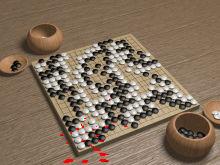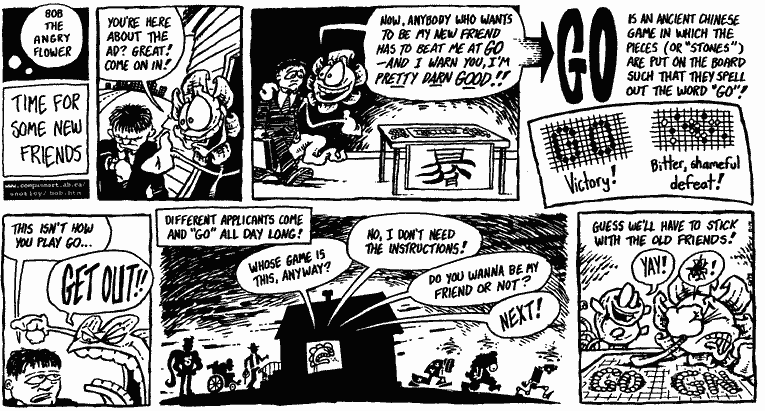Go (game)
Go (碁), or Igo (囲碁) is a really, really, really really old Asian game which uses shiny black and white stones (not to be mistaken for candy, such as Mentos) on a grid-like board called a Goban (碁盤). The game is too complicated to explain here to ever play, so, like chess, most people just buy the game and store it under their pile of Xbox games. Suffice it to say that it is the source of the saying "a lifetime to learn, a minute to master." The object of the game is to secure as much territory of the board you can and at the same time kill and devour eat as many of the opposite player's stones as possible (Caution- stones are often made of glass and do hurt. This is the reason doctors are required at all go games). These captured stones, or prisoners, can be exchanged for prisoners of war to be returned at the end of the game under degrading and dishonouring circumstances after being forced to build railways and starved to the point that their skeletons are visible. Then once the Jedi have been defeated, the empire will arise one again. It is also a philosophy of life that teaches you to be humble and modestly in control of yourself and all that Japanese jazz. Many think the Chinese invented the game of Go as a propaganda campaign to disillusion the minds of anime geeks and various other. CA-14"gaijin".
Every game of Go you play takes three days off your life. The first day is taken by playing the game, and the next two are spent recovering yourself to a form that can chew solid foods again. There is a common misconception that the game is based on the movie, "Go". Even though there are many links between the two, the movie has lots of "stoners" which are not to be confused with "stones" which are used in the game. Another source of this confusion was from when plutocrat Montgomery Burns built a human Go board, using people from lower socio-economic backgrounds and/or drug addicts as stones.

Rules of the Game[edit | edit source]
In spite of its complexity, Go is considered to be one of the simplest games in the world. The game has only a few rules, but a myriad of techniques and strategies. The rules are
- The players alternate to make one move each, by putting a stone on some the Goban's crosspoints. Every time black places a stone, he must say "Go." Every time white answers this move, he must say "Fish." Failure to do so by either player results in a forfeit.
- When one player's stone or stones are totally surrounded by their opponent's stones, they are removed from the board as enemy prisoners.
- The winner is the first person to arrange their stones in the shape of the word "Go."

- If throwing the Goban in opponent's face, player should follow up with seppuku.
- For the audience: Don't talk to Go players! While playing, it is very inadvisable to try to answer in complete sentences, since this usually causes aneurysms.
- Recurring patterns in the game, known as joseki, must be rote learnt and played out without thought.
Criticisms of Go[edit | edit source]
Critics point out that Go is a wargame that teaches young people the art of becoming generals, leading massive, rotund armies. The critics of the critics point out that no matter what they say, these generals will be prepared to chop up any army led by a chessplayer into mincemeat.
Tactics of Go[edit | edit source]

The right way to play the game is really straightforward. You just start your fuseki with a few strong moves to enable your josekis in the corner, confuse with some tenukis, then you pull up your kikashis in order to secure your moyo along the sides. Then work on your yose while you reduce your opponent's aji. Now is the time to remember to stay in sente. Thrust in some hanes, don't be too greedy on ponukkis, go for shicho instead - or more profitable - find the right tesujis but wait with harvesting the semedoris until absolutely necessary. Don't put too much trust in the tengen. Wait until just before tedomari and sum up as much influence you can by putting opponent in semeai by avoiding damezumari on your own behalf.
After that - just make the last moves in sente and keep the ko-threat for last opportunities before you're forced into goatse.
At the end, the worst player gets enough komi points in order to win the game with half a point. Pointless.
While it is not necessary to learn Japanese to play Go, it is necessary to be drunk from hot sake meanwhile.
Good luck!
Comparisons to other Games[edit | edit source]
It's like scrabble, only with a binary alphabet. Some say it is like "Othello," but for straight people.
The final proof that chess is a much more simple game than go: It is possible to make a chess simulator in wiki.
Go should not be confused with Stop.
It has a vague visual resemblance to Checkers.
Complexity of Go[edit | edit source]
Go is a simple game to play, but it is very difficult in theory. In fact, the mathematic equation for the word Go is one of the most complex equations known to mankind: ¡(18x√(√(8Ğ!^3)17x√(15õ!^4)))/õ! This equation has only three known equals for complexity: "Bastille Day", a song written by Real Purty, one of the most complex musical thinkers today, song "2112", also written by Real Purty, but also played to death by Alex Lifeless, during the War of 2112, and another song known only as "Stream of Consciousness", a song written by the six-fingered John Petrucci.

